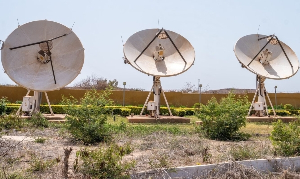The Ghana Bar Association (GBA) has called for the deletion of certain clauses in the Interception of Postal Packets & Telecommunications Bill, also known as the” spy Bill”.
Many Ghanaians including some Civil Society Groups have kicked against the Bill, saying the move will violate people’s privacy if passed into law by Parliament.
However, in a statement signed by its President, Benson Nutsukpui, the GBA argued that there was the need to completely delete clause 4(3) and (4) of the Bill in order safeguard people’s privacy. It further made some recommendations.
Below is the full statement:
GHANA BAR ASSOCIATION STATEMENT ON THE INTERCEPTION OF POSTAL PACKETS & TELECOMMUNICATIONS BILL
The Ghana Bar Association has taken note of the provisions of the the Interception of Postal Packets & Telecommunications Bill (the “Bill”) and wishes to make its views known on it as follows:
1. We welcome the attempt to consolidate the existing provisions on lawful interception of communication/correspondence, scattered in various formats in several statutes. We therefore suggest that all the current statutes on lawful interception are specifically harmonised within the context of the current Bill, and the relevant repeals and revocations done to avoid legislative confusion and disharmony.
2. The relevant provisions of the various legislation that must be specifically considered for consolidation, repeal or revocation, as the case may be, are as follows:
• Sections 43 to 51 of the Mutual Legal Assistance Act, 2010 (Act 807);
• Section 25(5) of the Economic and Organised Crime Office Act, 2010 (Act 804);
• Section 124 of the Electronic Transactions Act, 2008 (Act 772);
• Sections 73 and 100 of the Electronic Communications Act 2008, (Act 775);
• Section 34 of the Anti-Terrorism Act, 2008 (Act 762);
• Section 29 of the Insolvency Act, 2006 (Act 708);
• Sections 37 and 39(a) of the Postal and Courier Services Regulatory Commission Act, 2003 (Act 649);
• Sections 29 to 31 of the Security and Intelligence Agencies Act, 1996 (Act 526);
• Sections 27 to 30 of the Narcotics Drugs (Control, Enforcement and Sanctions) Act, 1990 (PNDCL 236);
• Order 60, rule 18 of the High Court (Civil Procedure) Rules, 2004 (CI 47); and
• Regulation 6(1) of the Electronic Communications Regulations, 2011 (LI 1991).
3. Further it is critical that Parliament considers several other statutes that contain protection of privacy and secrecy provisions, and how these may or may not be affected by the Bill. The relevant current statutes with protection of privacy and secrecy provisions are:
• Banking Act, 2004 (Act 673),
• Central Securities Depository Act, 2007 (Act 733),
• Children’s Act, 1998 (Act 560)
• Commission on Human Rights and Administrative Justice Act, 1993 (Act 456),
• Credit Reporting Act, 2007 (Act 726),
• Data Protection Act, 2012 (Act 843),
• Domestic Violence Act, 2007 (Act 732),
• Electronic Transactions Act, 2008 (Act 772),
• Juvenile Justice Act, 2003 (Act 653),
• Matrimonial Causes Act, 1971 (Act 367),
• Mental Health Act, 2012 (Act 846),
• National Health Insurance Act, 2012 (Act 852),
• National Identity Register Act, 2008 (Act 750),
• Public Health Act, 2012 (Act 851),
• Public Records and Archives Administration Act, 1997 (Act 535),
• Representation of the People Act, 1992 (PNDCL 284),
• Securities Industry Act, 1993 (PNDCL 333),
• Specialist Health Training and Plant Medicine Research Act, 2011 (Act 833), and
• Standards Authority Act, 1973 (NRCD 173).
4. We also note that telecommunication network operators will now be required, expressly and by law, to have interception capability, making it even more important that the law forbids, and provides punishments for, the misuse and abuse of that capability by any person, including the operators themselves. Currently, the strongest punishment appears to be the maximum 5-year imprisonment provided under the Electronic Communications Act. We would propose that this punishment is standardized for all violations, and that provision be made for appropriate sanctions directed at any operator who does or permits unlawful interception. Ghana has to put out a strong message that we support the use of lawful interception to prevent crime, but abhor the use of unlawful interception to violate the constitutional right of the individual to privacy.
5. We are also particularly concerned with the provisions of clause 4(3) and (4) of the Bill by which the National Security Coordinator is permitted to orally authorise interceptions for 48 hours without any court order or warrant. Our concern is two-fold.
6. First, we find the current legal position that requires a court order/warrant before any interception, to be legitimate as it provides, at least, a semblance of protection against arbitrary and unconstitutional interference. We need to find ways of strengthening this, instead of taking it away or deferring it. This is because the right to privacy being an undoubted fundamental and inalienable right, the attitude of the Constitution is to give it the most absolute form of protection subject only to the well-known exceptions that permit limited interference with it in the interest of the public such as the prevention of crime.
7. This is why the Constitution provides specific circumstances that justify any interference with the right. Those circumstances are the exceptions to the rule that protects the right to privacy. The Bill in its present form rather treats the invasion of privacy as the rule, and the protection of it, the exception. The Bill does this by allowing interference by the National Security Coordinator first, and then after 48 hours require him to seek judicial blessing or condemnation, if he so desires, after any possible harm has been done. Accordingly by this Bill there is a right to interfere first, and then where it can be shown that the right to privacy should be protected, then the court's will protect it.
8. It is to prevent situations like this that the doctrine of separation of powers which was propounded (and promulgated in our Constitution) to safeguard the liberty of the individual, must be applied in its pure form. It would be an oppressive law and may be challenged as unconstitutional if implemented in that manner. The Constitution, in Article 18, seeks to blunt the capricious effect of such circumstances by demanding safeguards that are rooted in the rule of law, best exemplified, for now, by making the judiciary (an independent institution) the first point of call for purposes of determining whether such interference qualifies within the exceptions justifying interference with a person's privacy.
9. Thus we find that the Bill in its current form is unacceptable. The proposed deferral of the court order/warrant for 48 hours under clause 4(3) would mean that there is no guarantee against abuse during this period of secret surveillance, which is based only on an oral authorisation issued by the National Security Coordinator. This, we think, would be a clear violation of Article 18 of the Constitution, and we recommend its deletion and the maintenance and strengthening of the current position where there can be no interception without a court order/warrant.
10. Second, the effect of clause 4(4) of the Bill is to declare as "lawful," information or evidence obtained during this 48-hour period of potentially arbitrary interception, suggesting that such information would be admissible in court proceedings. This provision has to be looked at very carefully, particularly as its application would suggest an erosion of the law on privileged communications contained in the Evidence Act, 1975 (NRCD 323). Specifically, this proposed provision conflicts with section 87(1) of the Evidence Act, which says that the provisions of Part Six of the Act, on privileged communication, "shall apply in all proceedings notwithstanding the provisions of an enactment or of a rule of law which make rules of evidence inapplicable or of limited application in particular proceedings."
11. Thus, arguably, information obtained during this 48-hour period, if "lawful" would become admissible even if it breaches (i) the privilege of an accused not to testify (section 96), (ii) the privilege against self-incrimination (section 97), (iii) lawyer-client privilege (section 100), (iv) legal work-product privilege (section 102), (v) mental treatment privilege (section 103), (vi) religious advice privilege (section 104), (vii) compromise communication privilege (section 105), (viii) trade secret privilege (section 108), (ix) political vote privilege (section 109), and (x) marital communications privilege (section 110).
12. It would appear to us that information that might have been otherwise privileged under any of these circumstances, save under the specific exceptions provided by the Evidence Act, would become admissible as the privileges would not apply if the same information was obtained during the 48-hour secret surveillance. This would have the effect of eroding a very important bedrock of our law of Evidence.
13. Finally, there does not appear to us to be any way or means of verifying whether information to be presented to the court, and obtained under the current clauses 4(3) and 4(4) of the Bill, would have been indeed obtained within or outside the 48-hour period, since that information is gathered with no supervision or reference to any other person except the National Security Coordinator. It is for this reason as well that there ought to be no interception without a court order/warrant.
It is on these bases that we recommend:
1. Proper legislative harmonisation,
2. Very severe sanctions for breaches of the right to privacy, and
3. The complete deletion of clause 4(3) and (4) of the Bill.
Dated in Accra this 11th day of March, 2016
Benson Nutsukpui
(National President)
General News of Friday, 11 March 2016
Source: atinkaonline.com













